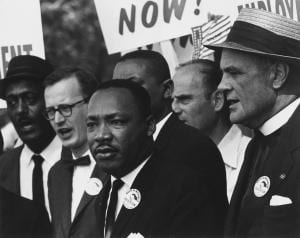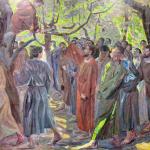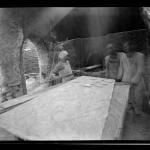
Martyrdom, baptism in blood, cleanses martyr from all their sins. Passion bearers, those who renounce the path of violence all the way unto death, imitate Christ in the way they accept death. Passion bearers, when confronted with death, do not fight back. They do not resist their killers. Instead, with a great love for humanity and a disdain for violence, they show love, compassion and forgiveness even to their murderers, imitating the way Christ faced his own death. Martyrs, unlike passion bearers, are killed specifically because they are Christian, while passion bearers are killed often for other reasons, such as political motives, but because they embraced the path of Christ, because they embraced the cross and what it taught, their deaths likewise give them over to God’s mercy and love, allowing them to be glorified in their death.
Before their deaths, martyrs and passion bearers were human. They were like everyone else. They had ordinary lives. They did ordinary things. They made mistakes. They sinned, just like all of us. Some of them sinned worse than others. Some of them only had a full conversion to Christ at the end of their lives. Some, of course, were quite devout and holy, with little which could be said against them before their untimely deaths. But, they did not need a lifetime of such holiness to die holy. We can see this in s the way some martyrs became Christian at the time of their death (this happened with the martyrs of Sebaste; one of the guards set to watch over those who were to be martyred, seeing the power and strength of their faith, rejected his old way of life and announced his conversion as he joined in with them and allowed himself to be executed with the rest of the martyrs, becoming one of them).
What martyrs and passion bearers had done before their death was seen to be as nothing comparison to the grace they received, and shared to the world, through their deaths. Embracing Christ, confessing Christ all the way unto death, or dying in a way which imitates Christ’s death, freed them from their sins. Dying for Christ, as well as dying in a way of imitation of Christ, brings great pardon and merc. They truly died to the self, and by their death, have made full restitution for whatever sins they might have done in their lives.
It is in this spirit we can and should be able to understand the life and death of Dr. Martin Luther King Jr. He was a vocal proponent for equality, and for non-violent resistance to evil. He embraced the cross of Christ, even though it led to his own death. In his life, he was far from perfect; but those imperfections, and whatever indiscretions can be found concerning him must not be used to take away the value of his death. Nor should they be used to reject the greater good he worked for in his life, a greater good which he sought after because of his faith in Christ. He truly made things better. He helped change society, especially in and through the aftermath of his death.
Just as martyrs and passion bearers overcame the faults of their lives by the way they accepted death, Martin Luther King Jr., in his death, can be seen to have gone beyond himself, beyond his own faults and foibles, as he embraced the fullness of the cross and came to be like the passion bearers who came before him. We can acknowledge he was human and not everything he did was as good as everything else, but this can be said about any saint. He did indeed fall to some very human foibles, but those are as nothing compared to the greatness of his work, a work filled with such grace that he lived what he preached and died as he lived, a promoter of non-violent resistance as a way to promote the common good. Acknowledging those foibles shows us that they did not get in the way of his mission, and that we, likewise, in our faults and sins, should not give up following the mission Christ has given to us; we should follow through with what Christ has given us to do all the way to the end, to let the light shine in and through is, even if we, in our lives, sometimes act in ways we wish we did not. The light of grace is greater, and the darkness in the end cannot overtake it if we embrace the light.
To besmirch the work of Martin Luther King Jr. by focusing on his human weakness is to ignore the greater value of grace. But this is what hate seeks to do: undermine grace, for grace comes out of and from the God who is love, the God who expects us to live out and follow the dictates of love. His critics, following hate instead of love, seek to divert our attention from all the grace which can be seen being shared by his work by having us look to and focus on his foibles, using them to make us question whether or not his objectives should be followed by us. But since they come out of grace and the mission given to him, the answer is a resound yes. We should not fall for such an ad hominem.
Martin Luther King Jr. did not seek for easy grace. He desired social harmony based upon justice, but he knew that the reconciliation needed to establish such a just society would require much penance from those who caused or benefited from racial strife. They must repent of what they have done and work to heal the damage caused by racism. The dream of Martin Luther King Jr. can happen only after those who have embraced racism, those who benefit from racism, those who ignore the harm of racism, have truly come to understand the evil of racism and join in with Martin Luther King Jr. and others, not only in denouncing racism, but creating a new society, one in which racism no longer can exist. The dream can only thrive when systematic racism itself is cast aside, and society, as a whole, repents of its past and makes restitution. It is important for us to realize that Martin Luther King Jr., in his embrace of non-violent resistance, in his embrace of the love of Christ, realized he must also show the way himself, which is what non-violent resistance was about. By putting the Sermon on the Mount in practice through non-violent resistance, he showed us that the dream required much from those who sought to fight against racism.
Martin Luther Kr. Jr. was human; when critics focus on his foibles instead of the grace which resounded in his message, they only do themselves a disservice, for how they end up judging King will be rendered unto themselves. Are they human, with foibles of their own? Would they want their mistakes, their sins, their passions, be used against them and the good which they do? Certainly not! Who among them embraced non-violent resistance to evil, and which one of them would be able to bear out the burden which is had by those living out a life of non-violent resistance to the end? Who among them can truly be said to have such great love in their hearts, even for their enemies, even for those who would persecute them? Yes, King was human; he was far from perfect, but he was also filled with great faith, hope and love, and in the end, such love truly covered his sins. He died in and with that love so that he died like a passion bearer, embracing the path of non-violence to the very end, connecting himself and his life and death, with Christ.
Grace perfects nature; those who embrace grace, those who embrace God’s love, especially at the end of their life, will find that grace will perfect their work, take the good which they have done and make it bear great fruit. This is certainly true with Martin Luther King Jr., for, in the aftermath of his death, things have never been the same. It is true. His dream remains unfulfilled. It is true, racism remains strong and deadly in the United States. But it is also true, many people have realized the truth of racism and have joined themselves to the work and mission of King, building upon the foundation which he started. The work continues to be relevant. The work now requires us to confront the great sin of racism, to realize it continues to propagate in society; it remained hidden for some time, but now the poison is once again set loose and out in the open. To heal society from its wound, we must rid ourselves of the poison once and for all. Let us make sure we do what we can. We must not allow it to fester any longer.
Stay in touch! Like A Little Bit of Nothing on Facebook.
If you liked what you read, please consider sharing it with your friends and family!













